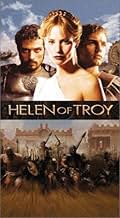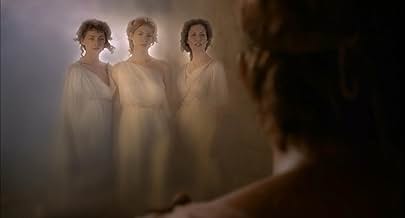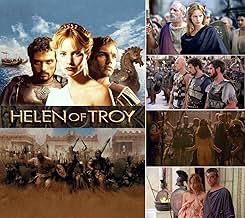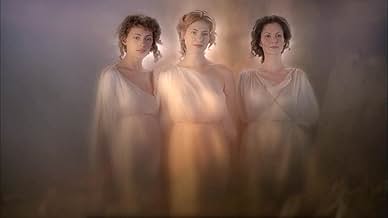NOTE IMDb
6,2/10
6,9 k
MA NOTE
L'enlèvement de la belle Hélène, épouse du roi spartiate Ménélas, par Paris de Troie déclenche une longue guerre.L'enlèvement de la belle Hélène, épouse du roi spartiate Ménélas, par Paris de Troie déclenche une longue guerre.L'enlèvement de la belle Hélène, épouse du roi spartiate Ménélas, par Paris de Troie déclenche une longue guerre.
- Nommé pour 1 Primetime Emmy
- 1 victoire et 7 nominations au total
Parcourir les épisodes
Avis à la une
DVD borrowed from my local public library, DTS sound, widescreen, each half on each of two disks, I watched it on consecutive nights. I was most drawn to it for Sienna Guillory, young British actress and daughter of a famous musician from Cuba, whom I had seen in the modern remake of 'The Time Machine.' She plays Helen of Sparta, who becomes Helen of Troy, and is the default object of passion which sparks the war and eventual fall of Troy, via the Trojan Horse. Agamemnon and Achilles are depicted as heartless killers with no redeeming qualities. I don't know what Homer had in mind, but this seems to be decidedly different from most earlier treatments of these mythical characters. The video transfer to DVD is very high quality, but the sharpness and realistic colors are not as effective as some period pieces (e.g. Gladiator) which use a mildly tinted image and selective focus to better depict the olden times. Still, for the type of movie it is, a worthwhile depiction of some important Greek mythology.
There were several images that were important in the movie. Helen really stood out to be the most beautiful woman at that time but there were a lot of differences from the text. In the movie, what she showed the audience was a childish lady who suddenly turns into a flirt. Sometimes, it is also hard to grasp her true emotions probably because this flirt image has enveloped her identity in the movie. What I admired about Paris was not his cute face. It is true that he looks fit for the character of Paris but what's more to that is you could see in his face his passion for whatever he's doing and saying. The image of a "pretty boy" was really fit for him. I am very fascinated with how Agamemnon was able to internalize his character very well. He portrayed a king who was really greedy but also showed a soft side. His facial expressions were also stunning especially his eyes. His portrayal of Agamemnon's character was constant all throughout the movie. Menelaus' identity was hard to depict because his identity in the Iliad was not totally exposed. What was admirable in him in the movie was his being a nice man or prince. I saw in him the change from the beginning of the movie to the end. You could see in him his sincerity in changing. Although Hector only had a small part, he was able to show the audience a noble Trojan. His image in the movie was different from the original text. He was not the strongest Trojan and he was even overpowered by his brother, Paris. Achilles was a totally different character. He was just a war and bloodthirsty warrior in the movie. It's as if he's just a bully in Helen of Troy.
The technical aspects for me were not that good. The voices were hardly audible. Sometimes, it's as if the actors and actresses were just murmuring to each other although the background music was suitable for the movie. It made you imagine what it was like before and how it felt during that time. There were scenes that were too dark that the characters could not be seen anymore but the shade of colors used were suitable for the time being illustrated in the movie. There were angles wherein a character was blocking someone else and it made it so hard to feel and see what's really happening but there were also shots that were nice. This was particular with the wooden horse. The angle of the shot made the wooden horse look so majestic and the audience would really be at awe with how the Greeks were able to come up with that plan and how they were able to make that wooden horse.
Overall, Helen of Troy is something worthwhile to watch not only because of Paris' look but also because the movie gave explanations on how things came to be and it brought its audience closer to the "reality" of the Iliad.
The technical aspects for me were not that good. The voices were hardly audible. Sometimes, it's as if the actors and actresses were just murmuring to each other although the background music was suitable for the movie. It made you imagine what it was like before and how it felt during that time. There were scenes that were too dark that the characters could not be seen anymore but the shade of colors used were suitable for the time being illustrated in the movie. There were angles wherein a character was blocking someone else and it made it so hard to feel and see what's really happening but there were also shots that were nice. This was particular with the wooden horse. The angle of the shot made the wooden horse look so majestic and the audience would really be at awe with how the Greeks were able to come up with that plan and how they were able to make that wooden horse.
Overall, Helen of Troy is something worthwhile to watch not only because of Paris' look but also because the movie gave explanations on how things came to be and it brought its audience closer to the "reality" of the Iliad.
As a big fan of mythology and the Iliad, I'm pretty surprised by how nitpicky people are being on the details. Having taken a "Mythology in Film" course, I can safely state the following:
1) It's not supposed to be "The Iliad," it's "Helen of Troy." 2) It's a film. Made 3,000 years later. Targeted at an entirely different audience. 3) Greek mythology tends to be greatly inconsistent anyway, depending on your source. 4) Patroklus is never mentioned to justify Achilles's rage against Hector. So what? If Achilles hadn't withdrawn from war, he would've killed Hector anyways. And having him withdrawing and re-entering into the war would only have distracted from the main story (Helen) without really adding anything.
There's a difference between myths and literature. One can stray from the literature of a story while staying true to the mythology of it. The Iliad itself was constantly being reinvented by generations of oral poets who changed the story every time they performed it. Back in ancient times, a person who merely recited the story verbatim would be considered an inferior, because he'd merely be a copycat rather than a storyteller.
When it comes to the spirit and tradition, "Helen" shines. For instance, in the Iliad, Achilles compares Agamemnon taking Brisius to Paris taking Helen. In the film, the comparison is made literal. Brilliant. Then you have themes and scenes taken from the Orestia. Three or four different ideas are brought together in the span of one.
"Helen" may be a bit loose with the details, but it shows a good understanding why those details took place, and stays true to capturing their motivations. Just because they don't follow the material exactly doesn't mean they don't know it really, really well. The same is true for a lot of other film productions, from "Desire Under the Elms" to "O Brother Where Art Thou" to "Medea" and even "Clash of the Titans."
All and all, a good flick, I was pleasantly surprised. My only real complaints was the casting of Achilles (I assume they were combining his character with Ajax/Diomedes) and the fact that Hector never gets to actually beat anyone in combat (That was disappointing, to say the least).
1) It's not supposed to be "The Iliad," it's "Helen of Troy." 2) It's a film. Made 3,000 years later. Targeted at an entirely different audience. 3) Greek mythology tends to be greatly inconsistent anyway, depending on your source. 4) Patroklus is never mentioned to justify Achilles's rage against Hector. So what? If Achilles hadn't withdrawn from war, he would've killed Hector anyways. And having him withdrawing and re-entering into the war would only have distracted from the main story (Helen) without really adding anything.
There's a difference between myths and literature. One can stray from the literature of a story while staying true to the mythology of it. The Iliad itself was constantly being reinvented by generations of oral poets who changed the story every time they performed it. Back in ancient times, a person who merely recited the story verbatim would be considered an inferior, because he'd merely be a copycat rather than a storyteller.
When it comes to the spirit and tradition, "Helen" shines. For instance, in the Iliad, Achilles compares Agamemnon taking Brisius to Paris taking Helen. In the film, the comparison is made literal. Brilliant. Then you have themes and scenes taken from the Orestia. Three or four different ideas are brought together in the span of one.
"Helen" may be a bit loose with the details, but it shows a good understanding why those details took place, and stays true to capturing their motivations. Just because they don't follow the material exactly doesn't mean they don't know it really, really well. The same is true for a lot of other film productions, from "Desire Under the Elms" to "O Brother Where Art Thou" to "Medea" and even "Clash of the Titans."
All and all, a good flick, I was pleasantly surprised. My only real complaints was the casting of Achilles (I assume they were combining his character with Ajax/Diomedes) and the fact that Hector never gets to actually beat anyone in combat (That was disappointing, to say the least).
Unlike the epic TROY, which spent much time and money recreating the spectacle of the Trojan War with CGI, the emphasis here is on the political ambitions and prophecies leading up to the start of the siege of Troy. Rufus Sewell as Agamemnon gives a performance (as the man who would conquer Troy) which eerily evokes Oliver Reed at his sinister best, as he makes it clear that the romance of Helen and Paris was merely a convenient excuse for the events that followed, and that the war came out of his own thirst for conquest. Sienna Guillory is attractive as Helen, but her role is rapidly reduced to that of a bystander in the great events that swirled around her. And the film makes clear its logic about this: how could a woman be responsible for a war in a time when even princesses were chattels of the royal houses to be auctioned off in marriage for political gain? As it deals more intimately with its characters and looks more closely at social power structures and gender roles of the period, this film is much more interesting as a human drama than the rather empty spectacle TROY.
I disagree with the reviewer who thinks Paris is prettier than Helen. Sienna Guillory is gorgeous! As in the Iliad Paris & Helen are a matched pair. I also disagree with the reviewer who panned the movie because it was not faithful to the Iliad. No movie, not even a TV miniseries, can be expected to be totally faithful to any book. A movie is always a selection. The question should not be what was omitted, or whether it compressed or altered the text for cinematic purposes. Of course it did! The question is whether or not it captured the spirit of the original, or whether it did violence to that spirit, as too many movies do. In my view this movie captured the spirit of the Iliad surprisingly well. Perhaps the Greek heroes, especially Agamemnon, do not come off as heroically as the modern viewer has come to expect. But then our idea of heroism, (confused as it too often is with idealism), is not Homer's; and, then again, this movies portrayal of the Greeks as devious aggressors plotting the conquest of Troy is both historically accurate and does nothing to distort Homer's portrait of them. He certainly would have agreed. I did feel that the movie became somewhat rushed at the end. Unfortunately, this seems to be a common problem with many movies based on classic works of literature. The director seems to lavish most of his energy and resources on the beginning and middle of the story. Then, as time and money begin to run out, the ending becomes hurried, episodes are combined, the story becomes perilously compressed. But even here, the movie does not really leave the viewer disappointed. The scene in which the Trojan Horse suddenly appears without explanation outside the walls of Troy is particularly effective, because it appears to the viewer just as it must have appeared to the Trojans. Even though one may wish for more, nothing in the movie's ending distorts Homer's tale of the fall of Ilium.
Le saviez-vous
- AnecdotesThis adaptation changes several aspects of the original legend of Helen. The gods play almost no role in the characters' lives, Helen is not shown to have any children and it's not explained how Cassandra supposedly got her powers. Instead, the series plays the story like a brutal historical event with little supernatural elements.
- GaffesIt is mentioned three times that Troy is the gateway to the riches of Byzantium. The city of Byzantium was founded in 667BC five centuries after the Trojan War.
- ConnexionsReferenced in In Praise of Action (2018)
Meilleurs choix
Connectez-vous pour évaluer et suivre la liste de favoris afin de recevoir des recommandations personnalisées
- How many seasons does Helen of Troy have?Alimenté par Alexa
Détails
- Durée
- 1h 28min(88 min)
- Couleur
- Mixage
- Rapport de forme
- 1.78 : 1
Contribuer à cette page
Suggérer une modification ou ajouter du contenu manquant



































